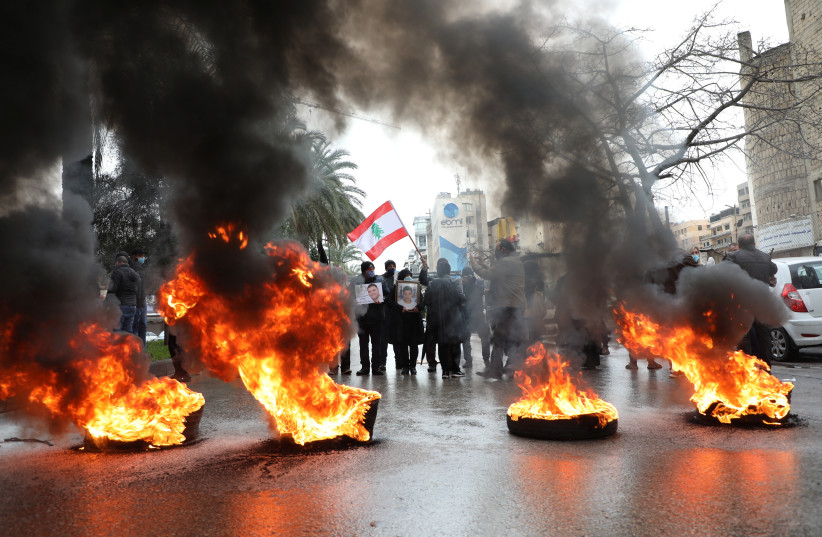A judicial crisis is ongoing in Lebanon following Judge Tarek Bitar’s decision to resume an inquiry into the 2020 Beirut Port explosion that had been frozen for more than a year. One day after the decision to resume the inquiry, which was frozen in 2021 after legal actions initiated against Bitar by political figures, Lebanon’s chief prosecutor Ghassan Oueidat claimed that Bitar could not proceed with the probe until the country’s judicial authorities rule on the matter. Oueidat also released all detainees related to the case and initiated legal proceedings against Bitar.
For more stories from The Media Line go to themedialine.org
The explosion, which killed 218 people, wounded over 6,500, and destroyed over 300,000 houses, was caused by the improper storage of ammonium nitrate at the Port of Beirut.
In response to Oueidat’s refusal to reopen the probe and to the legal action against Bitar, families of the explosion’s victims have begun protesting at the Beirut Palace of Justice, the main courthouse in Beirut and the seat of the Court of Cassation, the highest court of appeals. When the families, along with dozens of additional Lebanese citizens who joined the protest, attempted to enter the courthouse, they were held back by police forces. A statement on behalf of the blast victims’ families described Oueidat’s actions as “a political, security, and judicial coup.”
As part of resuming the probe on Monday, Bitar initiated legal proceedings against Oueidat as well as Hassan Diab, who was prime minister during the disaster, and other ministers and senior officials. Many fear that Bitar’s life may therefore be in danger, especially given Lebanon’s history of political assassinations. The families of the victims called on the authorities to assume “full responsibility for the safety of the judge.”

United Nations officer Sarah Copland lost her son Isaac in the explosion when he was just 2 years old, and she has been fighting for accountability ever since. “It’s really important to show how many actors were involved in the process to make the explosion happen,” Copland told The Media Line. “All of the actors were involved in the corruption since they prioritized self-profit instead of the well-being of the people of Lebanon.”
For family members like Copland who have been waiting for accountability for more than two years, Bitar’s announcement of the resumed investigation was a breath of fresh air. The investigation that Bitar took over 13 months ago had failed to move forward following opposition from various political factions, including Hizbullah.
Bitar told local media that he resumed the investigation “on the basis of legal studies carried out for a month to break the deadlock in which multiple judicial resources have placed the investigation.” He released five of the 17 detainees and summoned many high-ranking officials for interrogation, such as Oueidat, gaining the support of the victims’ families.
“We cannot talk about what justice will look like if we don’t have a proper investigation as soon as possible,” Copland said. “Every day that passes can help destroy more evidence, and people forget.”
Soon after Bitar resumed the investigation, Oueidat charged him with several crimes, including “usurping power,” summoned him for questioning, and banned him from leaving the country.
Oueidat also ordered the release of all detainees in the Beirut blast case. Those suspected of involvement in the explosion can now leave the country and dodge accountability. After being released from jail on Thursday morning, Muhammad Ziyad Al-Awf, head of the security and safety department at the Port of Beirut, evaded his travel ban by using his American passport to flee Lebanon.
Relatives of the victims fear that the investigation will be suspended. There is precedent for such a fear: Bitar’s predecessor, Judge Fadi Sawan, who was initially appointed to the investigation, was removed by the Court of Cassation in 2021 following high-level political pressure. But Bitar is convinced of his mission. “I will continue my probe until I issue an indictment,” he told Reuters.
For Rayya Badran, a Lebanese artist who led a soup kitchen initiative in Beirut after the disaster, the question of whether the investigation will take place is a matter of justice. “For the sake of those who died or those who are permanently disabled, we have to keep pushing forward for accountability, for responsibility,” she told The Media Line. “August 4 was, in all senses of the word, a catastrophe. We just want justice and accountability.”
Protesters, victims’ family members, and survivors are leading the fight for accountability alongside Bitar. “We want to know why these people died, why this ammonium nitrate was purchased and stored in the port,” Badran said. “I don't think any of us should rest before we find who is responsible for this.”
While relatives push for the local investigation to be allowed to continue, they are also pursuing legal routes in countries such as the United States in order to hold all the involved actors accountable.
“I just feel that if I ever get to see Isaac again, I will be able to tell him I did everything that I could do to get justice on his behalf, and at least if I am not successful, I have done all that I could do,” Copland said.
